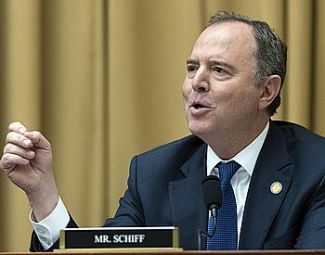Recently declassified documents indicate that people close to former FBI Director James Comey and Democratic Sen. Adam Schiff were connected to leaks of classified information to prominent reporters designed to portray Donald Trump and his allies as being in league with Russia.

Reporters from the New York Times and Washington Post shared a 2018 Pulitzer Prize for articles that used classified leaks to advance the Russigate hoax. (Credit: Eileen Barroso)
Written in 2017, the FBI documents expose how selected Washington reporters, including Ellen Nakashima of the Washington Post and Michael Schmidt of the New York Times, scored a series of Pulitzer Prize-winning scoops in 2017 by repeating false and inflammatory leaks during President Trump’s first term.
Although the heavily redacted recent disclosures do not specifically identify the suspected leakers, an RCI analysis of the documents strongly suggests that people close to Comey and Schiff, among others, were feeding the reporters information to advance the Russiagate hoax.
The documents reveal a cascade of misdeeds and failures. These include the effort of government officials to create and leak misleading classified information to favored reporters and the failure of reporters to scrutinize the information they were given before rushing it into print; and the subsequent failure of federal investigators to hold anyone accountable for the breaches of security.
The documents also detail the incestuous nature of media-government relationships inside the D.C. Beltway. In some cases, spouses and friends of government officials and reporters were used to spread damaging misinformation about Trump, making it difficult for federal investigators to follow the trail of illegal disclosures.
“All of these cozy friendships of leakers and leaker recipients, many of whom are married to each other, are precisely why reporters adore hiding their sourcing behind walls of ‘senior administration officials’ or ‘senior U.S. officials’ and associated disguises,” said Tim Graham, director of media analysis for the Media Research Center, a Washington-based journalism watchdog group.
‘Topple the Administration’

FBI documents suggest Rep. Adam Schiff weaponized U.S. intelligence to smear Trump in the media. (Credit: AP)
The new disclosures include the previously sealed testimony of an FBI informant who’d worked on the Democratic side of the House Permanent Select Committee on Intelligence for more than a decade, who told agents that “all hell broke loose” after Trump’s surprising 2016 election win. In February 2017, he asserted, Schiff, then a House member, hatched a plan to weaponize U.S. intelligence to smear Trump in the media as a Kremlin conspirator with the goal of triggering his impeachment. Schiff was the ranking Democratic member of the committee at the time.
“Leaking the information was one way to topple the administration,” the source told the FBI in August 2017, adding that “everything is directed at Trump and trying to get him impeached.”
To that end, Schiff formed a “Russia team” within the committee to view and disseminate classified material on Trump that it requested from the CIA and FBI, the informant said. Main team members allegedly included Schiff staffers Rheanne Wirkkala and Timothy Bergreen. Schiff’s staff director, Michael Bahar, and his communications director, Patrick Boland, allegedly “orchestrated” the smear campaign.
A spokesperson for Sen. Schiff “categorically” denied the allegation against Boland, now Schiff’s chief of staff, and claimed that the FBI informant was “a disgruntled former staffer who was fired by the House Intelligence Committee in early 2017 for a pattern of inappropriate conduct, including mistreatment of staff and compromising activity on foreign official travel.”
Records, however, show the informant left the committee in September 2017, and had made his allegations to the FBI in interviews with agents while he was still on staff, according to FBI-302 summaries.
Wirkkala, Bergreen and Bahar did not respond to requests for comment.
The FBI source, “who considered Schiff a friend,” told agents that he was called into the 2017 meeting during which Schiff specifically authorized leaking classified “dirt“ to reporters.
“In this meeting, SCHIFF stated that the group would leak classified information which was derogatory to President of the United States Donald J. Trump,” said the FBI interview report, known as an FD-302, which noted that the whistleblower memorialized the Monday, Feb. 13, 2017, staff meeting in an email he sent to himself the next day. “SCHIFF stated the information would be used to indict President TRUMP.”
Schiff has denied the allegations. The FBI subpoenaed some of the California lawmaker’s communications records, but never charged him with a crime. (Schiff is currently under investigation for possible mortgage fraud.)
The anonymous whistleblower – whose name is blacked out in the FBI reports, but according to multiple sources is Robert Minehart – worked as policy advisor to Schiff on the minority side of the intelligence committee. He first joined the committee in 2005, after then-ranking Democratic Rep. Jane Harman of California recruited him from the National Security Agency, where he worked as an engineer.
Minehart left the panel in late 2017 after he said Schiff loyalists “marginalized” him for complaining to both the committee’s security chief and the CIA’s inspector general about “the rampant leaking” of classified information. He told FBI field agents he believed the classified leaks were “unethical and treasonous,” but was reluctant to complain about them to the FBI congressional liaison office because he viewed the officials there as “too embedded with HPSCI staff and cannot trust them.”
Former committee staffers who worked with Minehart said he was a well-respected intelligence professional who was concerned with safeguarding classified information. They viewed him as credible, reliable, and nonpartisan.
More topics included:
- Leaking to the Press
- Cozy Relationship
- Whistleblower Allegations
- Ineffective Investigations
- A Curious Claim
- Media Collusion
